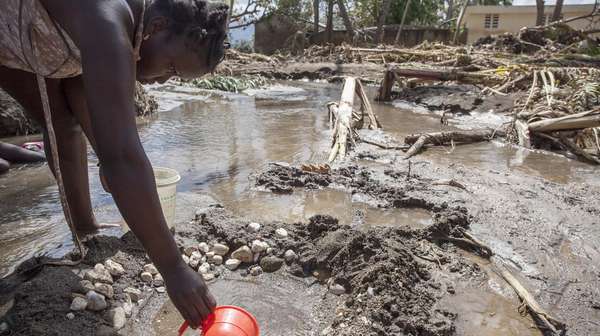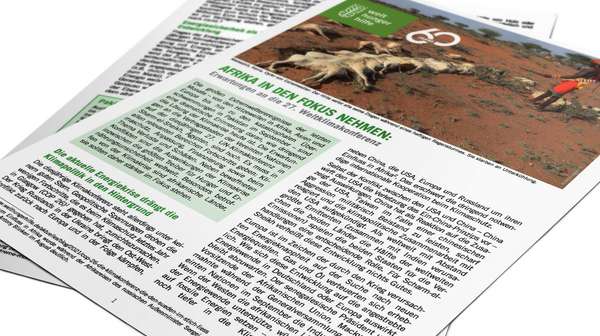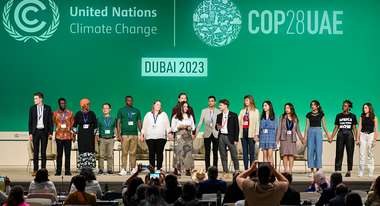The effects of climate change are a central cause of hunger, malnutrition and poverty.
COP27: Fighting symptoms is simply not enough
The 27th UN Climate Change Conference (COP27) has come to an end. Michael Kühn from Welthungerhilfe gives his assessment of the results.
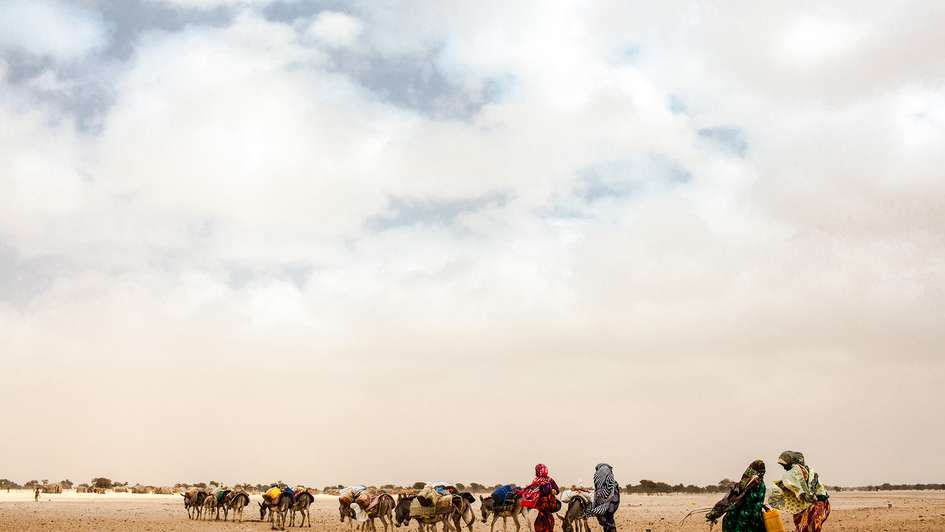
There is general agreement that COP27 delivered on one point. The loss and damage fund was adopted at this conference. Developing countries had demanded this compensation mechanism for 30 years. Some observers describe this outcome as a historic milestone, which came as a surprise, given the sluggish and protracted nature of the negotiations.
Rarely before have geostrategic interests been reflected so much in a climate conference as here in Sharm-el-Sheik. The attempted influence peddling of Western countries and China to gain the favor of African states, cast a shadow over the conference for two weeks. Complete failure of the conference was not out of the question two days before its end. There was simply no time left to deal with the pages and pages of unbalanced text proposals. So it was no surprise that the conference had to go into overtime.
European Union initiative
Then, shortly before the close, came the European Union’s (EU) proposal to set up a compensation and indemnity fund which brought renewed impetus to the debate. It was tied to the following conditions:
- It should benefit particularly poor countries
- States other than industrialized countries must also contribute (including China and Saudi Arabia in particular)
- Global emissions must peak in 2025 and then decline
- All countries must commit to the 1.5°C limit
A backward step from the Glasgow resolutions had to be prevented at all costs. Just the announcement that the fund would benefit only the most vulnerable and not all developing countries had the potential to divide the group of developing countries (the G77, which according to UN terminology includes China). In the past, China has always supported poor countries when it came to criticizing the countries of the Global North. However, the EU expected China, now the world's largest emitter of greenhouse gases (31%), to become one of the fund’s contributors. China and the oil states of the Gulf reject this, however, and also believe that their development opportunities would dwindle if they were to relinquish their status as developing countries.
Nevertheless, after several all-nighters, the Egyptian COP presidency was able to announce that the negotiators had agreed on the establishment of this fund. In its statement at the closing session of the COP, the EU expressed regret that no progress had been made on other crucial issues. Considering the urgent need for the loss and damage fund, especially in the Global South, it must now be made operational as soon as possible.
Rich countries, which are primarily responsible for global warming, must now mobilize new and additional funds to pay for climate-related damage in vulnerable countries. This will be a huge challenge given that replenishment of existing climate funds has lagged behind industrialized countries' promises for decades. It is planned that the fund’s formalities will be worked out by the next COP in Dubai.
Mitigation
Climate protection and mitigation are closely linked. Without decisive progress in greenhouse gas reduction, the impacts of climate change will become unmanageable, damage and losses will increase, and no amount of money in the world would be enough to deal with the devastating consequences of climate change. The EU, which has played an important role in maintaining the 1.5°C limit, announced at the COP its willingness to increase its Nationally Determined Contributions (NDCs) from 55% to 57%, but this is still not enough to limit global temperature rise to 1.5°C by 2030. It is important that all countries update their NDCs in line with the 1.5°C limit.
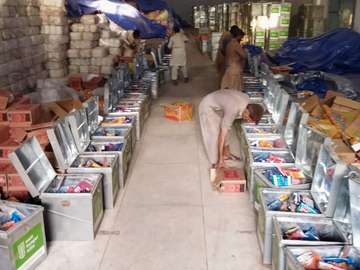
The Climate Change Mitigation Work Programme adopted at COP27, which will run until at least 2026, is nothing more than a call for governments to voluntarily do more. Governments should therefore infuse it with collective ambition to reduce global emissions by at least 40% this decade.
There was strong criticism from development and environmental groups that no agreement was reached on phasing out fossil fuels. While there is an agreement to invest more in renewable energy, without a phase-out of all fossil fuels, governments run the risk of exceeding the 1.5°C mark.
Climate finance
Industrialized countries have failed to meet their financial commitments, which has cost them credibility with the Global South. They were supposed to provide $100 billion annually in new and additional finance for climate mitigation and adaptation in developing countries. However, the lack of implementation has created mistrust. Therefore, COP27 was expected to have a clear plan for this implementation and ensure that the missing funds would be provided in the coming years. Unfortunately, industrialized countries succeeded in removing these key elements from the negotiating texts. What remains is a vague request to the rich countries to meet the funding target, with no deadline set.
A new approach to climate finance
Against the backdrop of difficulties for industrialized countries to provide sufficient public funds, the Barbados government has put forward an interesting and pragmatic proposal for a new approach to climate finance. This has attracted interest, at least in France and Germany. In the speech, Prime Minister Mottley drew attention to a problem with the international financial system: "This world looks, still, too much like when it was part of an imperialistic empire. The Global North borrows with interest rates between 1 to 4%. The Global South, around 14%."
This difference in the cost of capital is particularly problematic for investments in renewable energies. These have hardly any running costs because solar and wind are available for free, but for the initial investment, financiers naturally want to see a return, which varies by country. In addition, the Barbados PM calls for skimming 10% of profits from oil and gas companies. "How do companies make $200 billion in profits in the last three months and not expect to pay at least ten cents in every dollar of profit to a loss and damage fund?" asked Mottley in her speech at COP27. French President Macron plans to work with Mottley in the coming months on proposals to reform climate finance through multilateral development banks such as the World Bank.
Food security
Food security was a visible theme at a COP for the first time. Four pavilions addressed the problems of hunger and the transformation of food systems. Speaking at one of the sessions open to all conference participants, Johan Rockström of the Potsdam Institute for Climate Impact Research emphasized that the global food system has collapsed under the weight of four interconnected crises: climate change, the Russia-Ukraine war, ecological stress, and the pandemic.
Rockström called for an "agricultural revolution" approach that integrates "adaptation and mitigation into a resilient framework for agricultural development." Providing an insider's view of climate science, he stated that sustainable land use is critical to achieving climate goals: Increasing yields through sustainable intensification of agriculture with integrated land management should replace further expansion into natural areas, ensuring climate mitigation, food security, and ecosystem integrity.
Hunger and malnutrition are primarily caused by inequality in our global agricultural and food system.
In the context of the negotiations, the Koronivia joint work on agriculture working group, which discusses agriculture's vulnerability to climate change and approaches to improving food security through workshops and expert meetings, has achieved two goals. It reported on the main conclusions of its work to date and to lay the groundwork for the new structure under which it will continue its work in the coming years.
The negotiations were not easy and consensus was not reached until the final stages. Although there was no mention of agroecology as an appropriate framework for the transformation of agroecosystems – one of the main demands of many civil society actors – the joint work in Sharm-El-Sheikh on the implementation of climate change mitigation measures in agriculture and food security could pave the way for this and other topics.
Human rights and civil society
What the 2022 International Climate Conference (COP27) must achieve.
Civil society, particularly from the Global South, has expressed concern about the increasing difficulties in the participation of non-governmental organizations in the UN climate negotiations, both inside and outside the conference. Such groups have also criticized how their observer role is being hampered. During the two weeks, participants repeatedly expressed that there is no climate justice without human rights. Logistical challenges during the conference must also be mentioned: Difficulties in accessing water, food, affordable accommodation, meeting space, seating, and electrical outlets were a hindrance to the work of everyone, including parties and observers.
Conclusion
COP27 succeeded in doing something historic because of a ‘last minute’ initiative by the EU and its member states. If the establishment of the loss and damage fund actually succeeds and is properly financed, the most vulnerable countries will have gone home as the winners of this COP. However, the COP failed to deal with the factors causing climate change: the phase-out of fossil fuels is not sufficiently addressed and regulated, and the reduction of greenhouse gases is based on voluntary action and is more a request than a resolution with a fixed target. Thus, it will be difficult to even reach the 1.5°C limit. Admittedly, alongside COP27, there were announcements such as the Global Shield Financing Facility, partly a German initiative, as well as additional money for adaptation funds. But combating the symptoms is not enough, and it will also be extremely expensive if significant steps are not taken at the same time to combat the causes of climate change. The most significant of these steps remains the reduction of greenhouse gases.
So we have to be prepared for an increasing number of extreme weather events today and in the foreseeable future, which will continue to cause floods, droughts and other climate events. These will lead to the destruction of nature and livelihoods, and cause displacement. Due to this, we can already be sure that hunger levels next year will be higher than this year. Every year, more money is needed for humanitarian aid – money that is not available. This is anything but a rosy outlook, and not only for the people in the Global South.





